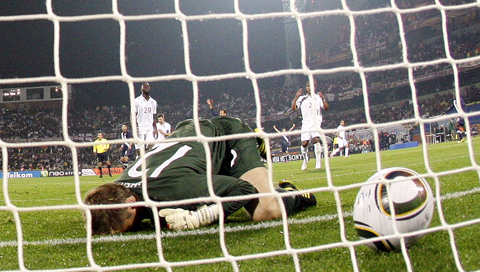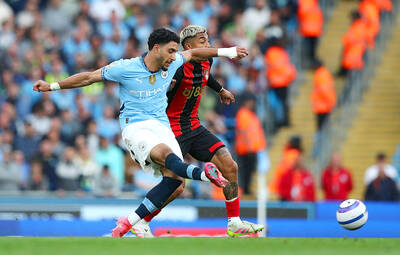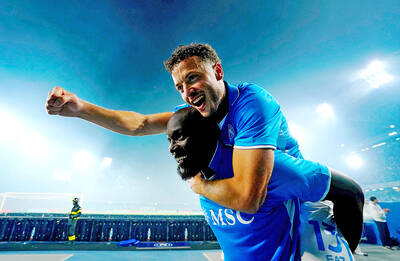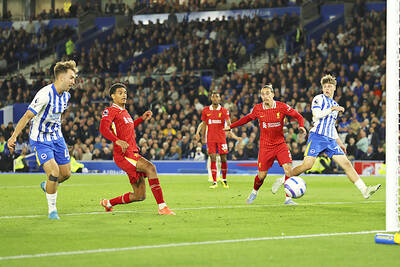GROUP C
▲England
▲United States

PHOTO: REUTERS
British headline writers had a field day critiquing Robert Green’s horrendous fumble which cost England a victory over the US in their opening World Cup match on Saturday night.
“The Hand of Clod” was so obvious that it was the headline tabloids News of the World and the Sunday Mirror both used as a banner over images of the bumbling England goalkeeper.
For more than two decades, the British have been referring to a contentious goal by Argentine Diego Maradona which knocked England out of the 1986 World Cup quarter-finals as the “Hand of God.”
The News of the World, calling it “Shock ‘N’ Draw,” asked if “Rob still too Green for England” and describing his “howler” as Yankee doddle to Yankee doodoo.
Even the Sunday Times tapped into a deep well of sentiment in the Anglo-American meeting, making an oblique reference to US anger over the Deepwater Horizon oil spill and the British oil giant BP’s inability to stop the massive environmental disaster in the Gulf of Mexico.
Under the headline Green Fingers, the newspaper’s soccer correspondent in Rustenburg wrote that it was: “One disastrous spill the Yanks won’t complain about.”
“A scrappy, uncomfortable draw against the second-ranked side in Group C may not stop Capello’s men topping it, but it is hard to see England going too far in the knockout rounds if they fail to improve,” the paper reported.
Green was well positioned as he went down to stop a seemingly innocuous 25m left-foot shot from Clint Dempsey in the 40th minute, but the ball slipped off his gloves and rolled into the net, giving the US an equalizer. The match finished 1-1, upsetting England fans while American fans rejoiced.
For his part, Green doesn’t think the blunder will scar him mentally, or wreck England’s chances of progressing to the next stage.
“It’s done, it happened,” Green said. “It’s about being steady and taking the rough with the smooth, but that’s life as a goalkeeper.”
“I’ve been in this situation before and it’s about holding your head up high, facing you guys [the media], taking the flak which is going to come. That’s life,” he said.
The Daily Star on Sunday described Green’s performance as “Rob-bish,” saying it cost England two vital competition points, then added him to the list of England’s Hall of Goalkeeping Horrors under the heading “Rob-bed of the Points.”
The Mail On Sunday, called it a “Calamity!” But that’s not likely to help matters for England’s already low stocks of goal custodians. David James, another of the England squad keepers, already has that nickname.
The English national anthem even came into play in the Sunday Mirror’s analysis. Instead of invoking “God Save The Queen,” the Mirror reported: “God Save Our Green.”
England’s leading players closed ranks yesterday to defend Green.
“It was a bad moment for Rob Green, a freak goal, and he owned up to his mistake in the dressing room,” England captain Steven Gerrard said.
“That goes to show what kind of man he is — and he made a fantastic save in the second half, which shows he has the character to bounce back. He’ll be very important for us,” he said.
He denied the result had put the team under extra pressure.
“We played some nice stuff after scoring our goal, but there is room for improvement. It was important not to lose — in the first game there’s always a lot of nerves,” the scorer of England’s fourth-minute goal said.
Green’s catastrophe was a schoolboy error, but it was not the only reason England failed to win.
At times, England looked as uncomfortable on the field as they had in the tight-fitting three-piece suits they all wore for the short grim-faced bus journey from their hotel to the stadium.
Capello’s rigid adherence to a 4-4-2 system with two wingers and a pair of strikers left central midfielders Gerrard and Frank Lampard exposed in vast areas of space, often outmaneuvered when the US had the ball.
Both US wide players, Dempsey and Landon Donovan, drifted infield to support Ricardo Clark and Michael Bradley, weaving good moves and retaining possession, during spells when a stretched England looked like a punch-drunk boxer on the ropes.
The lack of pace in defense was one of the most evident problems, particularly after Ledley King, already suffering chronic knee problems, picked up a groin injury and was replaced by Jamie Carragher. King will miss Friday’s game against Algeria in Cape Town.
With the defense playing so deep to avoid being embarrassed by pace, England made it easy for the Americans’ to condense and control midfield, leaving strikers Emile Heskey and Wayne Rooney frustrated and both wingers reduced to fleeting moments of threatening possession.
Rooney has now failed to score in any of England’s last seven games.
To seasoned observers of England at World Cups, however, there are consoling memories of the 1966, 1986 and 1990 campaigns when, often inspired by player-power to change tactics, they respectively won the trophy and reached the quarter and semi-finals.
Coach Alf Ramsey’s triumphant 1966 team started with a drab 0-0 against Uruguay, while Bobby Robson’s 1986 team lost their opening game to Portugal. His 1990 team also started badly with two draws.
In each tournament, changes brought success. Ramsey decided to omit top goal-scorer Jimmy Greaves and bring in Geoff Hurst, who went on to score a hat-trick in the final, while Robson was forced by injury and players’ opinions to overhaul the team, rejuvenating its shape and penetration.

SSC Napoli will have to wait one more week to seal the Serie A title after on Sunday being held to a goalless draw at Parma, while closest rivals Inter drew 2-2 in a dramatic game with SS Lazio. Antonio Conte’s team stayed one point ahead of Inter and were unfortunate not to win after twice striking the woodwork through Andre-Frank Zambo Anguissa and Matteo Politano, while Scott McTominay also had a free-kick tipped onto the crossbar. The away side thought they would be handed a chance to take the points from the penalty spot in the 96th minute when David Neres

Omar Marmoush’s stunning long-range strike on Tuesday upstaged Kevin de Bruyne on the Manchester City great’s Etihad farewell. Marmoush let fly from about 30m to put City ahead in their 3-1 win against AFC Bournemouth in the Premier League. The victory moved Pep Guardiola’s team up to third in the standings and left qualification for the UEFA Champions League in their own hands heading into the last round of the season. “It’s really important. To be in the Champions League after what happened [this season] will be really nice,” the City manager said. De Bruyne was making his final home appearance for City before

TIGHT FINISH: Napoli only needed to do the same as or better than Inter, who won their game against Como 2-0 on the same day, leaving Napoli with a one-point lead The two players who Antonio Conte wanted more than any others secured Napoli their second Serie A title in three years on Friday. Scott McTominay scored with an acrobatic bicycle kick before halftime and Romelu Lukaku doubled the lead with a solo goal after the break in the decisive 2-0 home win over Cagliari. Conte became the first coach to win the Italian championship with three different teams. “Everyone contributed to this — but the coach most of all,” Napoli captain Giovanni Di Lorenzo said. “Napoli needed him to get back on top. He’s phenomenal.” Comparing it to his three Serie A titles won

Brighton & Hove Albion’s Jack Hinshelwood on Monday sealed a dramatic 3-2 victory against Liverpool to leave the English Premier League champions without a win since clinching the title. Arne Slot’s side took the lead through Harvey Elliott’s early opener before Yasin Ayari equalized at the American Express Stadium. Dominik Szoboszlai restored Liverpool’s advantage just before halftime, but Brighton staged a late fightback as Kaoru Mitoma leveled before Hinshelwood came off the bench to net with his first touch. Liverpool have taken just one point from their three matches following the title-clinching rout of Tottenham Hotspur on April 27. The Reds have lost at